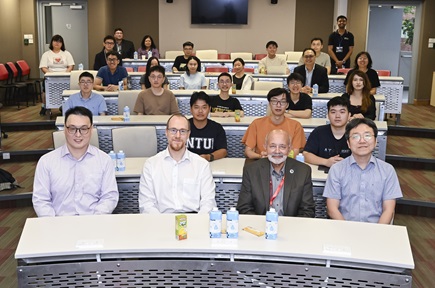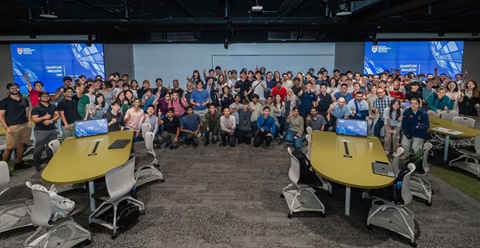Chaos, Randomness, and Complexity in Quantum Many-Body Physics by Dariel Mok Wai Keong
IAS STEM Graduate Colloquium Jointly Organised with the Graduate Students' Clubs
The IAS@NTU STEM Graduate Colloquium, jointly organised with the SPMS Graduate Students’ Club, featured a fascinating talk on 5 June 2025 by Dariel Mok Wai Keong (Caltech) titled Chaos, Randomness, and Complexity in Quantum Many-Body Physics.

Dariel’s research sits at the crossroads of quantum information science, many-body physics, and atomic, molecular, and optical (AMO) physics. His work seeks to uncover universal emergent phenomena in quantum systems, with potential applications in precision metrology, quantum control, and secure quantum communication.
He began by exploring the familiar concept of classical chaos, epitomised by the butterfly effect, where tiny differences in initial conditions can lead to exponentially diverging outcomes. However, defining chaos in quantum mechanics is more subtle. The reversibility of quantum evolution and the uncertainty principle fundamentally limit the applicability of classical chaos concepts to quantum systems. He explained that while quantum states evolved from nearly identical initial conditions remain close in Hilbert space, signatures of chaos can still manifest through energy level statistics and information dynamics.

Dariel explained how quantum chaos emerged despite reversibility and constraints of quantum mechanics.
To illustrate this, he presented the case of a 1D quantum Ising magnet with competing magnetic fields. In such systems, the energy level spacings exhibit universal behaviour that mirrors the predictions of random matrix theory — specifically, the Wigner-Dyson distribution seen in chaotic systems. In contrast, integrable systems display Poissonian level statistics.
This deep connection between many-body quantum dynamics and random matrices remains an area of active theoretical interest.
Moving beyond static energy spectra, Dariel discussed dynamical manifestations of quantum chaos. In a modern quantum analogue of the butterfly effect, applying a small local perturbation to a chaotic many-body system leads to the rapid delocalisation of information across the system — a phenomenon observed experimentally on platforms such as Google’s Sycamore quantum processor. This spreading of information underpins the process of quantum thermalisation, where subsystems appear locally thermal despite the global wavefunction remaining pure and far from equilibrium.
Dariel also introduced the concept of deep thermalisation, made possible by recent experimental advances that enable measurement of individual particles in many-body systems. By conditioning on the measurement outcomes of parts of the system, researchers have revealed that the resulting distribution of subsystem states approximates a maximally random ensemble. This emergent quantum randomness, arising from deterministic unitary evolution, offers new insights into the complexity of quantum information and its potential applications.
 Participants engaging in interactive Q&A.
Participants engaging in interactive Q&A.
In closing, Dariel highlighted recent theoretical results suggesting that the complexity of chaotic many-body states may fundamentally limit our ability to efficiently extract information from them — even with advanced quantum algorithms. This interplay between quantum chaos, complexity, and computational limits remains an exciting frontier in quantum science.
His presentation offered an insightful overview of this rapidly evolving field, bridging deep theoretical questions with experimental advances and potential technological applications.

Written by: Cui Peiyuan | NTU School of Physical and Mathematical Sciences Graduate Students' Club
“The presentation was very clear even though I had completely no background on this topic” – Crystal Yang Ting (PhD student, CCEB)
“I enjoyed the way the presenter makes links to real world problems” – Duvvuri Seethapathi Srinivasa Rohit (PhD student, MSE)
“I appreciate that the speaker demonstrated great enthusiasm and passion about his research during the presentation. Kudos to him!” – Choong Li Yan Anthony (PhD student, MSE)
Watch Recording here.



.tmb-listing.jpg?Culture=en&sfvrsn=c45c3c7e_1)



